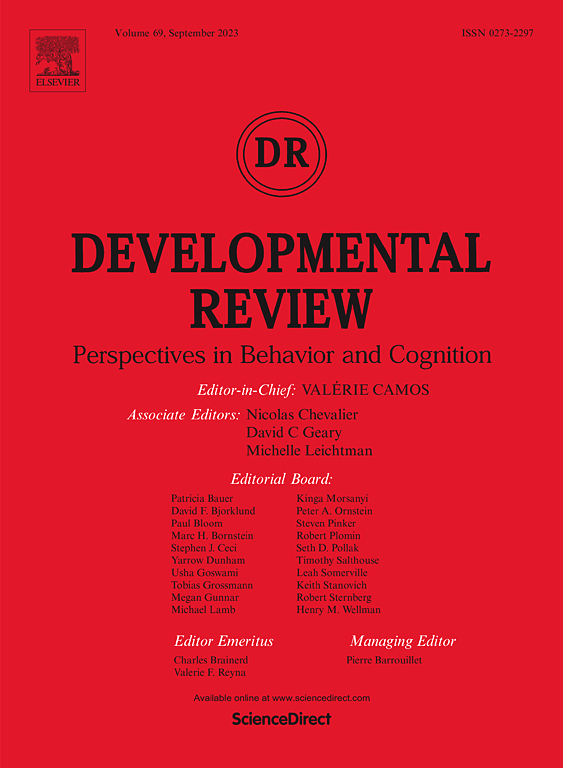在追求目标的过程中,注意力和工作记忆是如何协同工作的:抽样-记忆权衡的发展
IF 5.6
1区 心理学
Q1 PSYCHOLOGY, DEVELOPMENTAL
引用次数: 0
摘要
在过去的50 年里,大多数关于视觉工作记忆和注意力的研究都使用了一种经典的心理物理学设置:参与者被指示注意或记住一组项目。这种设置回避了认知控制的作用;努力是最大的,任务是简单的,策略是有限的。虽然这种方法产生了重要的见解,但它没有提供通往综合理论的明确途径(Kristjánsson &;Draschkow, 2021),就像通过让大学生跑50码短跑来研究一个城镇的可步行性一样,它有关注边缘情况的危险。这里,在这篇理论观点文章中,我们论证了一种方法,在这种方法中,根据智能体的目标,从功能上理解智能体和环境之间的动态关系。这意味着游戏的重点将从执行一项狭隘任务(“记住这些项目!”)的机制转变为对自然目标(“制作三明治!”)的控制。,土地&;地板,2001)。在这里,我们强调了在环境中利用目标相关信息与在工作记忆中保持它之间的抽样记忆权衡。我们提出了这种权衡的动态反馈模型-个人权衡获取外部信息的主观成本与将其保存在记忆中的成本-使用基于经济原理的现有认知控制模型的见解(Kool &;Botvinick, 2018)。这种权衡在儿童身上尤其有趣,因为内部资源的最佳利用在有限的情况下更为重要。我们的模型对未来的研究做出了一些具体的预测:1)一个孩子在环境中注意目标相关信息的努力与在工作记忆中保持它的努力之间达到了一个首选的平衡;2)为了保持这种平衡,随着潜在的记忆和认知控制机制随着年龄的增长而改善,孩子将不得不越来越多地转向记忆;3)年龄较大的孩子将对不断变化的任务需求表现出更大的适应性。本文章由计算机程序翻译,如有差异,请以英文原文为准。
How attention and working memory work together in the pursuit of goals: The development of the sampling-remembering trade-off
Most work in the last 50 years on visual working memory and attention has used a classic psychophysical setup: participants are instructed to attend to, or remember, a set of items. This setup sidesteps the role of cognitive control; effort is maximal, tasks are simple, and strategies are limited. While this approach has yielded important insights, it provides no clear path toward an integrative theory (Kristjánsson & Draschkow, 2021) and, like studying a town’s walkability by having its college students run the 50-yard dash, it runs the danger of focusing on edge cases. Here, in this theoretical opinion article, we argue for an approach where dynamic relationships between the agent and the environment are understood functionally, in light of an agent’s goals. This means a shift in emphasis from the performance of the mechanisms underlying a narrow task (“remember these items!”) to their control in pursuit of a naturalistic goal (“make a sandwich!”, Land & Hayhoe, 2001). Here, we highlight the sampling-remembering trade-off between exploiting goal-relevant information in the environment versus maintaining it in working memory. We present a dynamic feedback model of this trade-off – where the individual weighs the subjective costs of accessing external information versus those of maintaining it in memory – using insights from existing cognitive control models based on economic principles (Kool & Botvinick, 2018). This trade-off is particularly interesting in children, as the optimal use of internal resources is even more crucial when limited. Our model makes some specific predictions for future research: 1) an individual child strikes a preferred balance between the effort to attend to goal-relevant information in the environment versus the effort to maintain it in working memory, 2) in order to maintain this balance as underlying memory and cognitive control mechanisms improve with age, the child will have to increasingly shift toward remembering, and 3) older children will show greater adaptability to changing task demands.
求助全文
通过发布文献求助,成功后即可免费获取论文全文。
去求助
来源期刊

Developmental Review
PSYCHOLOGY, DEVELOPMENTAL-
CiteScore
11.00
自引率
3.00%
发文量
27
审稿时长
51 days
期刊介绍:
Presenting research that bears on important conceptual issues in developmental psychology, Developmental Review: Perspectives in Behavior and Cognition provides child and developmental, child clinical, and educational psychologists with authoritative articles that reflect current thinking and cover significant scientific developments. The journal emphasizes human developmental processes and gives particular attention to issues relevant to child developmental psychology. The research concerns issues with important implications for the fields of pediatrics, psychiatry, and education, and increases the understanding of socialization processes.
 求助内容:
求助内容: 应助结果提醒方式:
应助结果提醒方式:


